International Projects
|
Small Projects in the South Pacific
since 1967. |
|
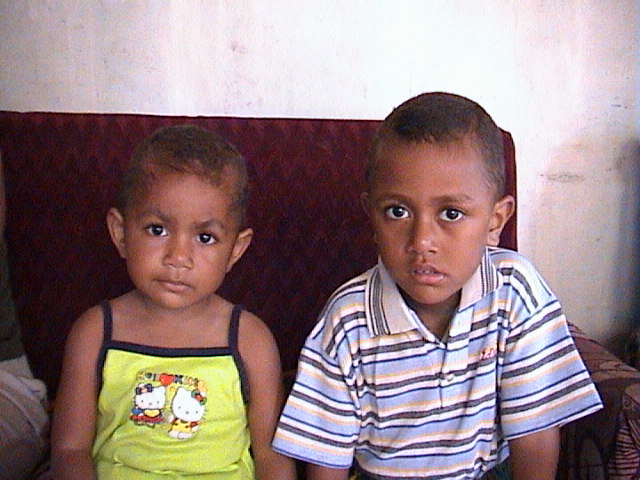 |
-
1967. Yick Gee, Director of International
Committee reports that $100 was approved for text books to be
purchased and sent to Fiji. In 1968 a further $150 was approved for this project.
-
1970. Ted Easterbrook successfully places 5
Samoan boys in local apprenticeships and found accommodation
for them.
-
1972. $210
was approved for a rotary hoe to be sent to the Agricultural College in the Cook Islands. Dispatched in early
December of 1971 but by April 1972 no notification of its arrival had been received so the
Club wrote to Rarotonga Rotary Club. No word was ever received as to whether the hoe had
been received, and for a period the Club was wary of projects in the South Pacific.
|
-
1973.
Club donates a subscription to the Agricultural Journal to the Navuso
Agricultural College of Fiji, for 5 years.
-
1975 Comment that still no word
received re Rarotonga project of two years ago! Jim Moerwa from Rarotonga Rotary Club
agrees to be a liaison officer for Club.
-
1977 A Beseller Opaque projector
acquired with the help of a grant of $350 from the South Pacific Jubilee Trust.
This was packed and shipped to the Niue Islands Education Department.
Considerable searching went into getting the model requested.
-
1979. A Solar Heater project to St Andrews
College, Nuku'alofa, Tonga. The cost was $438 and it was sent to
Nuku'alofa care of the NZ Shipping Co. Notification was received that the unit had
arrived safely and been installed. The school sent
handicraft as an appreciation of thanks. These goods were passed to the
Auction committee.
-
1980 Hand tools were collected for a Rarotonga
High Schools' woodwork room.
-
1981 Another solar heater going to St John's
College, Tonga at a
cost of $600. Ted Skudder gifted fittings. There was also a shipment of fertiliser
shipped to Tonga.
-
1983. Club donates $500
to X-ray machine in Fiji at the request of Dr Sahu Khan, Nadi hospital.
This was funded from a Casino night which
raised $275. This was supplemented from the Club's funds.
-
1986 Cloths for Sister Zita's
school, Logoi'polutu in Samoa dispatched. This same year, Ron Ward
completed the Samoa Water tank project at the school.
-
1995. Bob
McCaw, while home on holiday from his work based in Fiji, collected Form Seven texts
from a number of Hawkes Bay Secondary schools which were redundant to their
requirements. The Club organised the transport of these texts to Nuku'alofa, Tonga,
where they were made available to students of the newly established Tongan Form 7
College. Many of these books ended up in the College library.
-
1999. 30
electric typewriters became available as part of the Computers to Tonga
project . These were offered to the Ministry of
Education in Tonga. They accepted them and sent them to 'Eua High School.
-
2009. Tools
for Vanuatu. Contact came from Past President Nevin Dawson, currently sitting on
the Bench as a judge in Port Vila. He forwarded a request from an ex-Taradale woman,
Marg Smith of the International Women’s Group of Vanuatu.
Marg Smith wrote
“The IWG has been helping Mr Naiev of Tanna for
seven years. Tanna is a large island in the southern end of the Vanuatu group. Mr Naiev
is reliable, and now needs extra help. He has a mini mill and people who go to his
workshops have their own timber. He shows them how to cut and construct furniture. At
present he is hiring tools.”
Required were: level box, bricklayer’s trowel, claw
hammer, hacksaw, power planer, drill hammer, bench plane, tin snips, carpenters’ tap ,
measure, hand saws, vice, clamp, chisel set, square, glass cutter, carpenters’ pencils,
air glove, bolt cutter. Grant McDonald, Chairman of International,
organised a
collection, mainly from members who made donations of surplus tools.
These were shipped off and gratefully received by a local
tutor of basic trades skills.
Return to top...
|
| Working with the Save the Children Fund (SCF)
organisation |
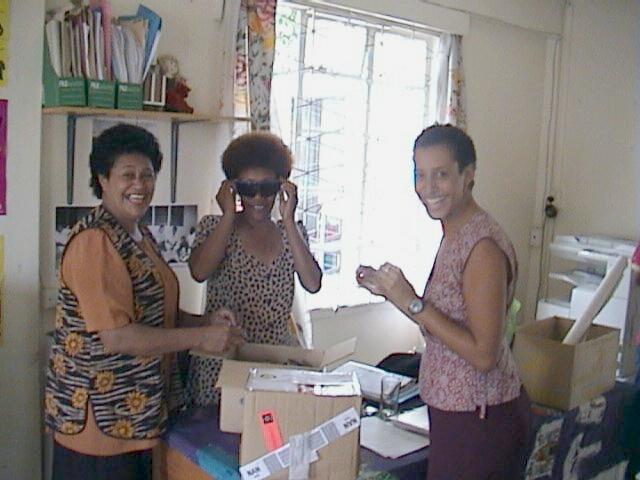
Save the Children team, Suva, Fiji.
Glasses arrive 2003. |
The Club has had a 30 year association
with the Save the Children organisation.
Club support has taken three forms
-
Collecting during the organisations annual
fundraising appeals
-
Sponsoring a young child's education through
SCF's child sponsorship program
-
Donations of books and glasses
|
-
Appeals
-
Over the Club's history, members gave a lot
of their time each year in helping raise money in door-to-door appeals. The first record
of the Club supporting SCF appears in 1975 when members assisted with an appeal which
raised $1175.
-
The last record of assisting with street
appeals was 1992.
-
Child Sponsorship
-
Support for this programme appears to
have started in 1976 and continued for 20 years. $200 was donated to Save the Children for a
Fijian child.
-
In 1977 and second Fijian student was
sponsored
-
In 1979 the Club started supporting a student in Kenya while continuing to sponsor
the two Fijian students.
-
The support programme continued and in
1991 the Club started support for Ritesh Maharaj in Fiji and
while at the same time completing the education of Mustak Ahamad in India.
-
Support for Ritesh continued until 1994
when his education was completed. Bob McCaw, while living in Fiji, visited Ritesh at
SCF headquarters in Suva.
-
In 1996 the Club started sponsoring of
Tomoci Sevutai with $200 for his fees.
-
Books and Glasses
-
The Club had been sending books to Fiji
since 1967, but in 1993 it used its contact with Bob & Glenys McCaw, who were
currently living in Suva, to send books which Glenys had distributed through
the local branch of SCF.
-
This was repeated in 1995 when 20-30
cartons were packed and sent to Save the Children in Suva.
-
In 1998 Glasses to Fiji was organised by
Jim Dobbie, and Bob McCaw (now back with the Club) delivered 260 glasses to the
SCF organisation in Suva while on a working trip. A letter of thanks was received from Irshard Ali, Manager of SCF,
Suva.
-
The same project was repeated in 2002 with the delivery of two boxes of glasses to Save the Children
in Suva.
|
|
Return to top...
1970
Books and Rotary
Hoe to Alafua College, Western Samoa
|
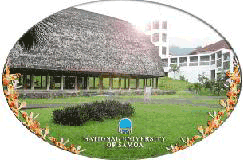 |
Purpose: In 1968 the Taradale Rotary Club's
International Committee, was asked for assistance in helping this new
agricultural college with books and equipment.
|
|
Means:
In October 1968. Directors approved a request
from the committee for $50 from the Paul Harris Fund to assist Agriculture College of Samoa (Alafoa)
with books and acquire and renovate suitable agricultural machinery. In December
$150 was voted to this project, and Colin Rapsey reported the the International
Committee had raised $100. In April 1969 it was reported committee was having
difficulty in getting sports equipment donated. A rotary hoe suggested as a
possible piece if equipment. Books were purchased in June 1969 and a letter from
the Principal, Dr. P. Radford was
received thanking the Club for its assistance. A second hand rotary hoe was repaired
at a cost of $70 by a Club member. The hoe was dispatched but reported missing
by the Principal. Finally, on the 29th October 1970, Pres Jock Morris
was able to announce the hoe had turned up at the College!
Outcome: The Club can feel pleased with its efforts in
helping this Pacific Island school get started.
History: The college was
upgraded to a College of Tropical Medicine an in the 1980's absorbed as part of
the National University of Samoa, Alafua campus.
Return to top...
|
|
1972. Ethiopian Fistula Gynaecological Hospital. |
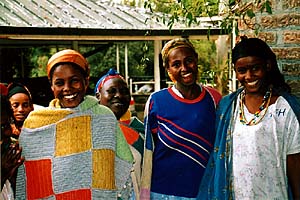 |
Purpose: In 1972, Dr Reg Hamlin, spoke to the Club on the work he and his wife were doing at the
Fistula Gynaecological Hospital in Addis Abba. The International Committee of the Club
decided to try and help in a small way. Dr Hamlin's father was an early settler in the
Taradale.
Means: Des Lanigan
and International Committee organised car wash. The wash raised $112 after about 45
members helped wash 110 cars.
|
| |
Outcome: While not a great amount, the contribution represents a link that this Club
has with what has now become an international famous hospital in its work with women in a
very poor third world country. In 1973 52 dozen optical glasses were collected on behalf
of Sister Crombie. an also dispatched to Ethiopia. It is not known if the destination was
the hospital.
History: A search of the Internet
reveals the following about Dr's Reg and Catherine Hamlin. The extracts are taken from a
site related to the release of her book "The Hospital by the River: A Story of Hope"
|
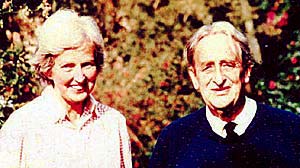 |
This is the story of Dr Catherine Hamlin, Fellow ad eundem, Chief Executive Officer of the
Addis Ababa Fistula Hospital in Ethiopia. Dr Hamlin has earned international admiration
for her and her late husband Reg Hamlin’s (who died in 1993) work in the treatment of
Ethiopian women suffering from shocking injuries as a result of childbirth.
|
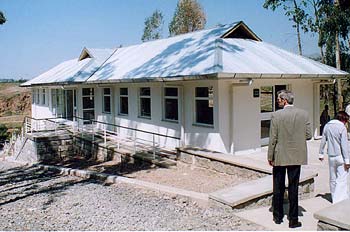 |
The Doctors arrived in Ethiopia about 40 years ago and were stunned to find that many
young women suffered horrific internal injuries which left them with urinary and faecal
incontinence. The young women were often ostracised by the community and forced to live
lives of abject poverty. In the vast majority of cases the child died at birth.
This
wonderful book tells the story of how the young women are cured with intricate surgical
techniques and how they are restored to health so that they can lead fulfilling lives.
Often the girls remarry and have healthy children in a safe environment. Sadly, the
injuries still occur today and the work is still ongoing and needs support. |
|
Catherine Hamlin was born in Sydney Australia and graduated from the University of Sydney
in 1946. She met and married a New Zealander Dr Reginald Hamlin when they were both
Senior Medical Administrators at Crown Street Women's Hospital Sydney. In 1958 they
answered an advertisement in the Lancet Medical Journal, for an obstetrician and
gynaecologist to establish a Midwifery School in Ethiopia.
In 1958 they answered an ad in a Medical Journal for an obstetrician and gynaecologist to
establish a Midwifery School in the General Hospital in Addis Ababa. They then went
to Addis Ababa in 1959 on a three year contract with the Ethiopian Government.
Return to top...
|
|
1981.
Operation Pharmac
|

Peter Sugden, Dr Ted Morris, and project convenor,Doug Rees |
Purpose: The project,
sponsored by the Taradale Rotary Club, aimed at the collection, from
households throughout the Napier district, of unused medical preparations.
Means: Peter Sugden, Dr Ted Morris,
and project convenor,Doug Rees,
organised the collection by encouraging people to clear out their medical
cabinet of unused drugs and bring them into local pharmacy collecting points.
After collection, they were identified and sorted by a doctor-chemist team
for delivery to a New Zealand relief agency, Medical Aid Abroad, who organised
the recycling to clinics, hospitals, refugee camps and disaster areas in the
South Pacific and South-East Asia areas. Success for the project —dubbed
"Operation Pharmac" — depended heavily on the co-operation and goodwill of
the people of Napier, who responded brilliantly.
Outcome: Many poor people in third world regions
benefited from this collection. It was the first of a number of glasses projects conducted
by members of the Club.
|
|
Return to top...
|
|
1987-91
Harold Howard helps Vietnamese
Refugees |

Click the thumbnail icon to read more
about this remarkable project. |
Purpose: In 1987 Harold Howard,
Dentist, and member of the Taradale Rotary Club, decided he wanted to assist Vietnamese
refugees, the "boat people" escaping intolerable conditions which arose from the
political aftermath of the Vietnam War.
Means: He was accepted
under Rotary International Volunteer Service Abroad scheme to work as a dentist for 3 four
week periods from 1987 to 1991 in Hong Kong. As a result of his experience, he helped
organise a project to upgrade dental equipment in the refugee camps. The Club became
involved and contributed $US500 in support.
Outcome: The matching grant project was successful and over $11,000 of new equipment was provided for the camps. Many refugees
benefited from Harold's humanitarian service.
Harold was awarded a Paul Harris Medal in 1990 for his
outstanding contribution to International Rotary.
|
|
Return to top...
|
|
1993. Books
into the South Pacific
|

Click the thumbnail icon to read more
about this remarkable project. |
Purpose: In 1989, Bob McCaw resigned from the Club
to work in the South Pacific, based in Suva, Fiji. However he continued to use
his links with the Taradale Club to assist in the organisation of books in the
South Pacific countries.
Means: Books were collected from
local Hawke's Bay schools who were upgrading their own books and prepared to
make redundant books available for the project Expertise within the Club was
tapped into to get the books collected, sorted, packed and transported to Island
schools, where recipients were organised to collect and distribute them
Outcome: Essential text books and readers were placed in
grateful South Pacific Island schools
|
|
Return to top...
|
|
1993 Rotahomes in Fiji
|
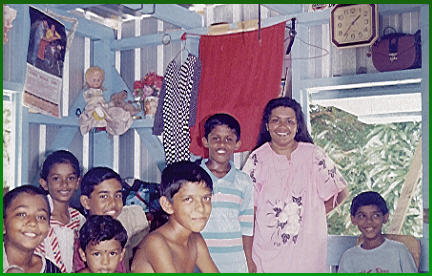 |
Purpose: Members of
International were shown a video about the Rotahome scheme and were supportive. This
programme has taken off internationally, and Clubs around the world sponsor the building
of a simple home to alleviate the poverty many rural Fijians experience living in tiny
tin shacks.
Means:
Bob Twaddle was asked to look at fund raising. It was decided to use Home Hosting funds.
About $900 is required to build a home. Approaches to the Rotorua Rotary Club
indicates they are willing to share half the cost. However the Te Kuiti RC write re-sharing costs
of a Rotahome and co-sponsor with the Club
Outcome: The Club can feel pleased that another family in Fiji is now living in
improved conditions.
|
|
The following report was published that year in the
Taradale Courier
|
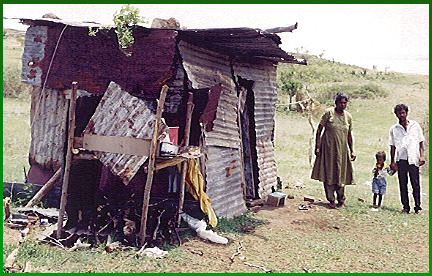 |
Funds give vital shelter
A Fijian family now has basic shelter and living
essentials thanks to funds raised by the Taradale Rotary Club.
The family
of seven was evicted from a "terrible hovel of a shack" near a crematorium on the edge
of a mangrove swamp. The flimsy, 4m by 2.5m subsiding shack was subjected to floods,
tidal waves, cyclones, flies
and mosquitoes, according to Rotary information. |
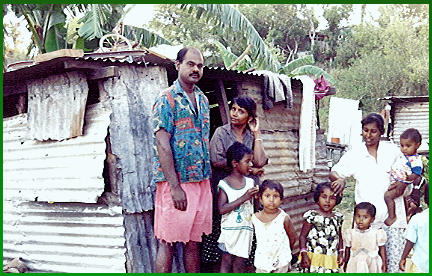 |
Last year
Taradale Rotary joined with its Te Kuiti equivalent to raise money for a "Rotahome", a
two- room ventilated house. It recently received pictures of the completed home, and
the thrilled family.
Building the Rotahomes is a
international Rotary project, launched by the Lautoka Rotary Club in early 1985 after
devastating cyclones left nearly 10,000 people homeless. It is hoped that by the year
2000 there will be no families living in sub-human conditions anywhere on the west
half of Fiji. |
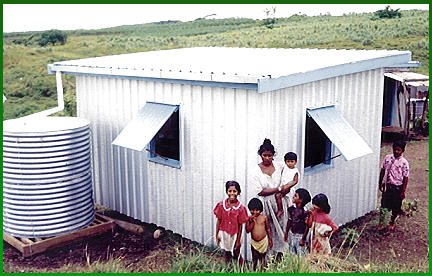 |
So far 417 homes had been built
(at a rate of two a week) to break the cyclone-build-cyclone-build cycles, and 118
water tanks have been erected to help stop disease.
Rotary is trialling solar and
smokeless ovens. |
Return to top...
|
|
1994. The Yakkum
Rehabilitation Centre, Indonesia
|
|
 Purpose:
In early 1994, Dan Cotton
spoke to the Club about the rehabilitation of physically disabled children in Indonesia. "Dan explained how Colin McClennan
initiated this essential work to provide medicine, surgical correction and assistance
with schooling and work training." Purpose:
In early 1994, Dan Cotton
spoke to the Club about the rehabilitation of physically disabled children in Indonesia. "Dan explained how Colin McClennan
initiated this essential work to provide medicine, surgical correction and assistance
with schooling and work training."
|
|
The again in November 1996, Dan introduced two speakers
who are associated with the Centre.
"Dan Cotton introduced the two
speakers, Ibu Mundarsi & Jenny File, both of whom are from Indonesia where they
help run the Yakkum Rehabilitation Centre, a church run organisation established with NZ
assistance in 1982 by the NZ Rehab Trust of which Dan is a member. The Centre is now
entirely run by Indonesians but the NZ Trust still assists with finance.
"Ibu spoke on the structure of the
Centre. The objective of the Centre is to rehabilitate disabled people to become useful
members of their communities. The Indonesian population is 190,000,000 made up of 17,000
islands, 6000 of which are habitable. 5,800,000 are disabled in some way, 1,600,000 being
physically disabled. To get into the Centre a person must be from a very poor family,
between 4 - 25 years old, permanently physically disabled, be capable of rehabilitation,
and have no other means of assistance. The assistance given is in the form of medical
services, education, vocational training in such areas as wood carving, electrical repair,
hairdressing, sewing,"
Means: The International
Committee, chaired by Iain Angus, took up the challenge to raise funds to assist with the
purchase of such items as a wheel chair, artificial leg, or pay school fees etc. They
asked that the Sergeants fund for a week go to this, with the Club then matching it dollar
for dollar. It was reported the $300 was raised.
-
In 1994, however the Club donated $1000 to the
Trust making up the amount raised.
-
Again in 1997, the Club donated $1000
to the Trust.
Outcome: The funds were sent to the Trust and used
to assist with rehabilitation. The Internet site for the Rehabilitation
Centre gives this account of itself:
Background: The YAKKUM Rehabilitation Center was
established in 16 November 1982 by formerly the name of Proyek Rehabilitasi Bethesda (=
Bethesda Rehabilitation Project ).
It has come to existence by the original ideas of Colin F.A McLennan MBE of New Zealand,
intended to assist in the rehabilitation of the physically disabled children and young
adults in Indonesia. Communion of Presbyterian and Methodist churches in New Zealand
financially supported the ideas through Rehabilim Trust. |
|
Return to top...
|
|
1994, Suturing Equipment to PNG
|

Out-going President Greg Gear,Change-over night 1995 |
Purpose: This was a project
where we really tried, but circumstances prevailed that were beyond our
control. The purpose was to provide much needed surgical equipment for the
local hospital in Garoka, PNG.
Means: In 1993,
Greg Gear decided to capitalise on his expertise in bee-keeping, and applied to
work for VSA in Papua-New Guinea. After two years trying to get a work permit,
he and Shirley eventually left for Garoka in the PNG highlands in 1993.
The Bulletin reports form a talk Greg gave after he had
returned to NZ and rejoined the Club.
"While in Goroka, Greg joined the Rotary Club,
whose members promptly decided he was President material (it must be that grey
beard), so Greg was duly inducted and presided over a membership of about 21.
During he "reign" he organised a matching grant program with TRC to provide
suturing equipment for the local hospital.
|
| |
Outcome: "However,
as so often happens in the Third World, the stainless steel trays which came
with them looked like great cooking utensils, and so they disappeared very
quickly!!"
"Greg concluded with the gems that while there he
had a school named after him, and a promptly bequeathed them a holiday known as
the Greg Gear Holiday!"
|
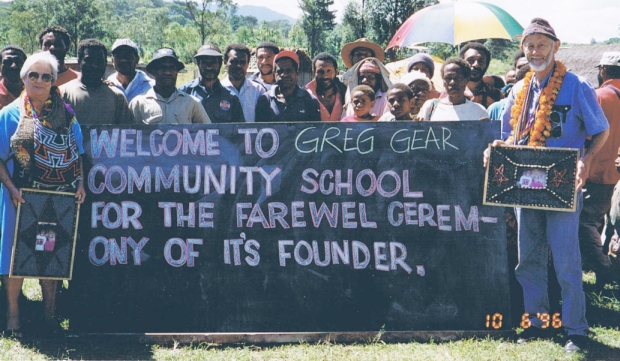
Greg Gear Community School, Famito. Shirley and Greg farewelled by teachers, students and parents, June 10th, 1996 |
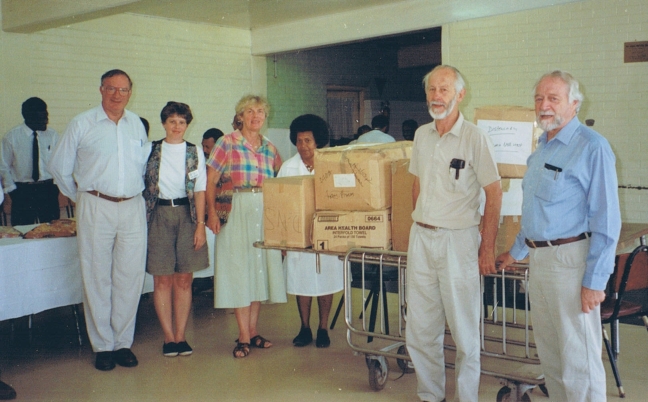
Garoka Hospital 1995. On the right is John Carrick, R.I. Director |
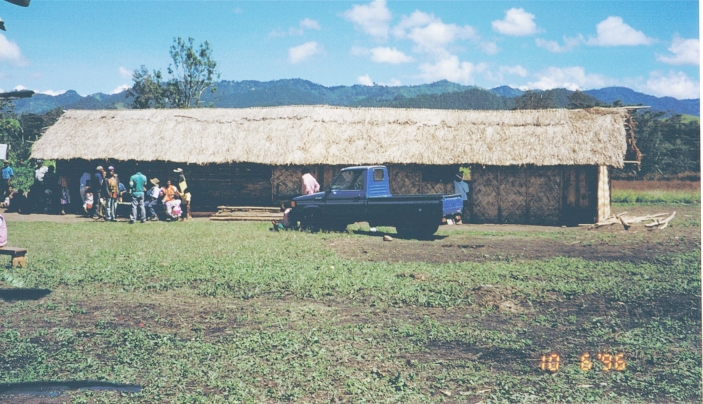
Greg Gear Community School Famito |
|
Return to top...
|
|
1986 Water Tank Project in
Samoa
|

Ron (left) with Sister Zita fourth from left |
Purpose: This project
started with a visit by Sister Zita to the Club. She had been
introduced by Dave Nichol. Her talk about the problems at
Logoi'pulotu School on the island of Savai'i in Western Samoa was taken up
by Ron Ward's International Committee, who organised books, farming
equipment, pumps, piping etc to help the school meet its needs. After the
goods had been shipped to the Islands, they sat on the wharf because no one
would pay the custom duty on them.
|
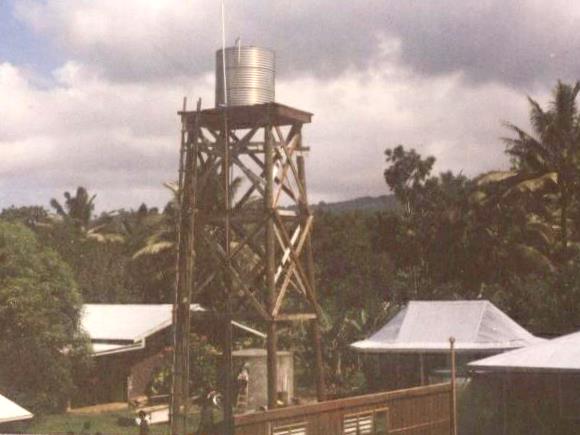
The tank and its header tower |
Means: The Club
decided to send Ron to Western Samoa, and Kel Tremain managed to organise
a free air ticket from Polynesian Airlines for Ron Ward. Ron got a letter
of introduction from NZ Foreign Affairs to the Prime Minister of Western Samoa,
and so armed, Ron departed to battle the local bureaucracy. A visit to the Prime
Minister's office gained Ron access to any government department he wished to
approach, and the goods were soon on their way to Savai'i.
Ron spent 8 days at the school completing the
water tank. A header tank already existed, but the holding tank had to be
completed, the tanks connected and a water pump connected. Sister Zita records
that on the 14th May, 1986 "The tank is finalised. Great rejoicing"
|

The completed
tank |
The Taradale Rotary Club had provided all the
materials to complete this project. The Club also provided an electric fence and
Ron was able to see that this was being effectively used to keep the school's
cattle fenced in.
Ron did additional work while in Samoa, setting up a radio
service using obsolete mountain radio service sets. During Cyclone Ofa in 1990, these sets
provided the only communication between the main islands of Savai'i and Upolo.
On a visit to the Club in November 1985 Sister Zita was
presented with a cheque for $3940 to help with renewing the water tanks. Dave Nichol
organises a 200 Club raffle for Sister Zita to raise additional funds.
|
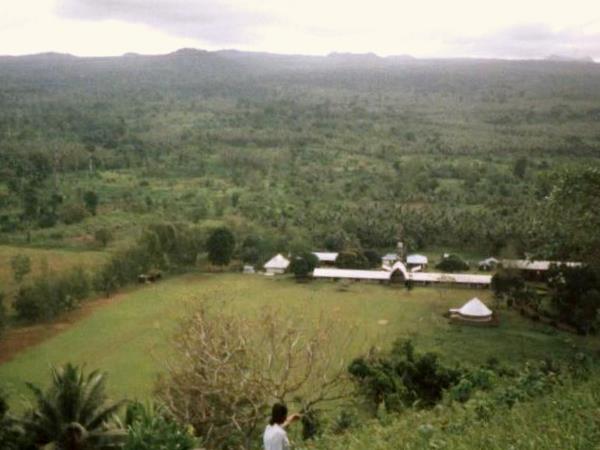
Logoi'pulotu School, Savai'i, Samoa |
Outcome: This project was a very successful one, one the Club can be proud of, as the
school was well served with water for the rest of its short history. The Catholic
Education Department in Western Samoa was forced to close the school in 1998 as enrolments
had fallen to unsustainable levels.
|
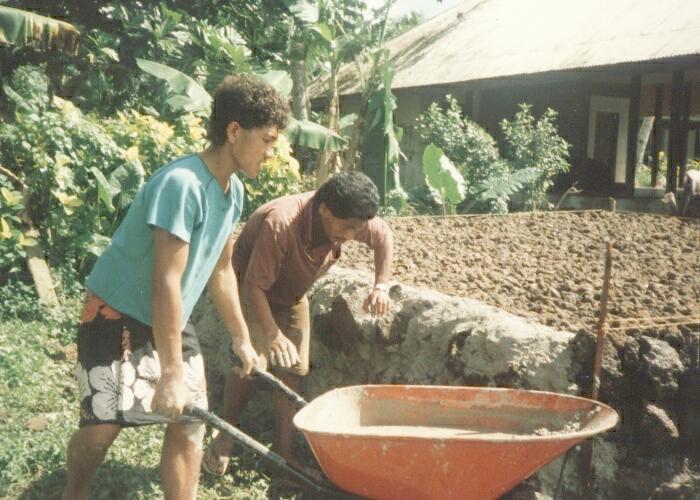
More preparations of the base |

School staff: Sister Zita, middle left, with the
Principal Sister Margaret Purdie, ex of
St Joseph Maori Girl's College.
Sister Christine Lowther, of Taradale, is left front row. |
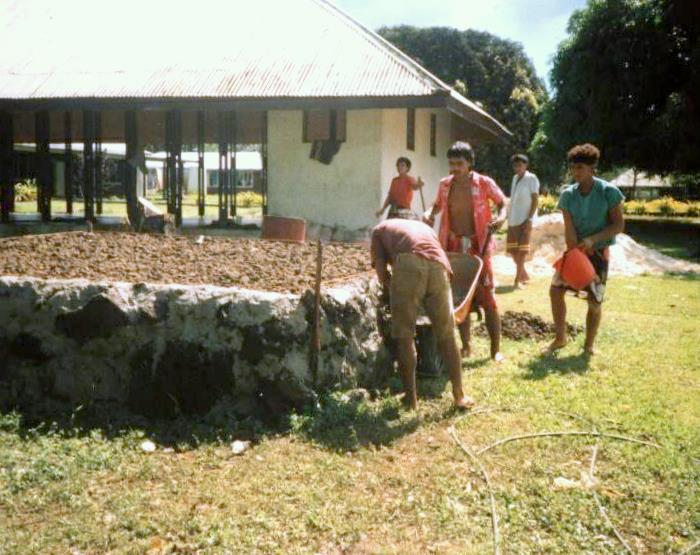
The base for the water tank being prepared |
|
Return to top...
|
|
2006. Project Heaven, Fiji.
(HEaring And
Vision ENhancement) |
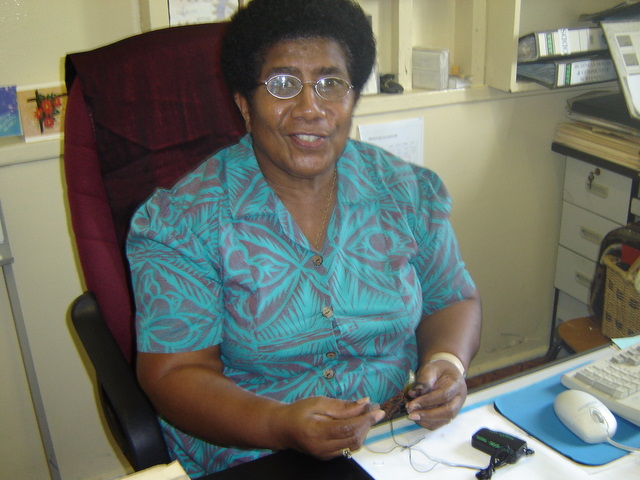
CEO, Project Heaven, Vani Volatabu. |
Purpose: Project HEAVEN , started
in October 1998, and is located at Tamavua Hospital, Suva District of Fiji. The
project conducts ear and eye screening for students in primary and secondary schools
throughout Fiji. Children with vision and hearing impairment are referred to the
nearest hospital or health center for medical intervention. The project also assists
in provision of eye glasses and hearing aids, and has established a network with
Fiji's Department of Education and Department of Health. |
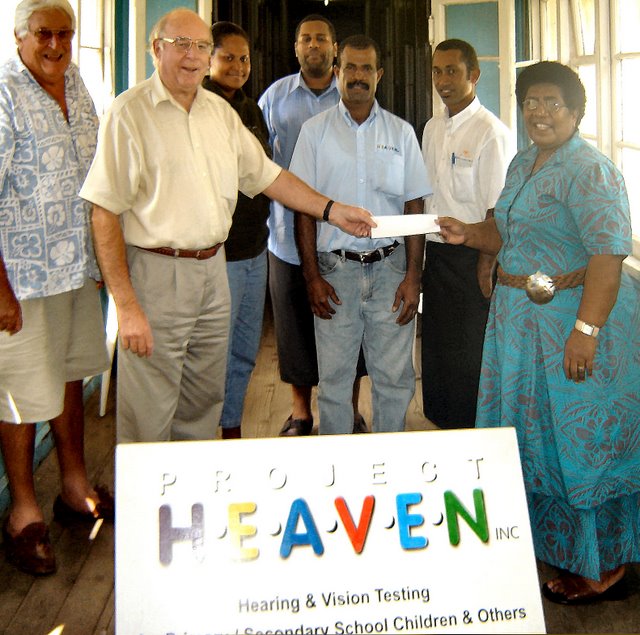
Bob McCaw presents $FJ1000 to Vani Volatabu. May 2006
Mal Paterson on the left. |
Means: In
2005, the Club was approached by a Trustee, and member of the Suva North Rotary
Club, John Hill. He sort support through Bob McCaw who regularly made up at
the Suva club when on working visits to the country. Bob brought the work of this
organisation to the attention of the Club Service Director, Janey Grant.
In 2006: The Bulletin reported "Janey Grant
enlightened us about “Project Heaven”. The donation of $1,000 mentioned in last
week’s Bulletin consisted of $600 raised from International Committee’s Home Hosting
and the balance from Club funds. It is a joint project with Suva North Rotary and
Bob McCaw, currently in Fiji, handed over the cheque which will go towards assisting
hearing disabilities suffered by some 200,000 Fijian children." |
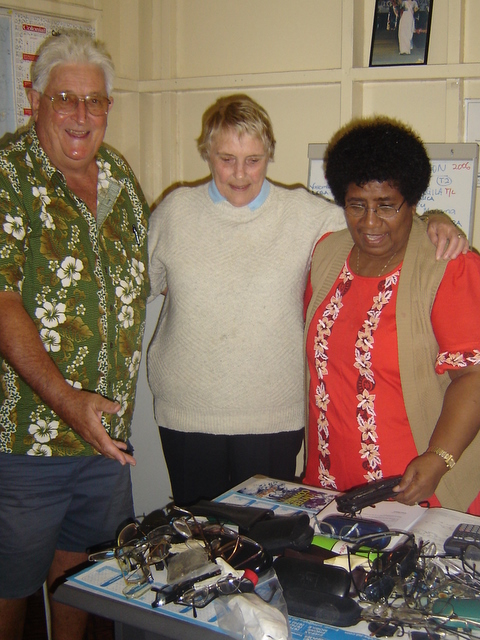
Glenys McCaw with Mal Paterson and Vani Volatobu,
August 2006 |
In May 2006. Bob McCaw, on a work trip to
Suva, took time out to visit the office of the HEAVEN organisation and
presented cheque of $FJ1000
to their Director Vani Volatabu.
In August 2006, Bob returned to Suva with his wife
Glenys. 100 pairs of glasses had been collected by Tom Royden of the
International Committee with the help of Brian Wright and others. Glenys delivered
them, with Malcolm Paterson of the Suva North Rotary Club, and a trustee of Project
Heaven, to the Trust HQ in Tamavua, Suva. The photo also shows Vani, the Project CEO.
They were delighted with the contribution and will accept as many as we can send.
These glasses will end up with children in the Lau group of islands. |
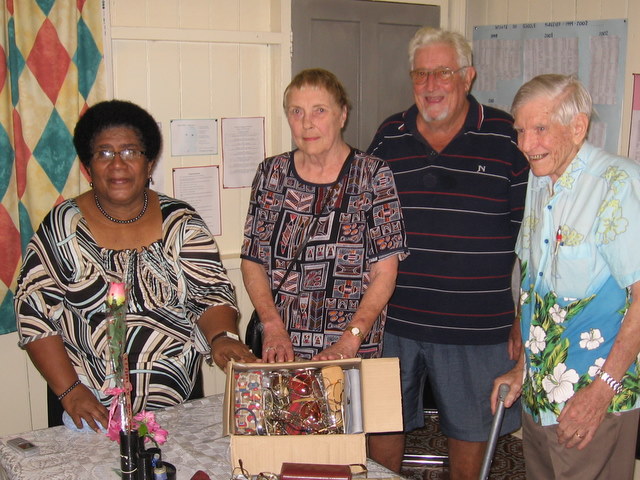
Vani, Glenys, Mal and Frank Hilton (Trustee, Heaven) |
In August 2008, the exercise was repeated following a
plea from Malcolm Paterson for more glasses. Alan White, with only 2 weeks
notice collected a box load which Bob and Glenys carried into the country and again
Glenys delivered the glasses with the help of Mal Paterson. |
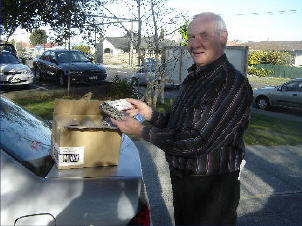
Alan White, Director of International, with glasses
collected in two weeks. |
Outcome: May 27 2010. Report in the Fiji
Times THE Australian Government has committed more than $0.25million to Project
HEAVEN to assist with the organisation's efforts to identify and remedy vision and
hearing problems among school children in Fiji.
The funding of AUD$150,000 (F$252,806.27)
was announced by the acting Australian High Commissioner, Sarah Roberts, at Veiuto
Primary School yesterday.
This support from AusAid is fantastic and shows that
our support has been well placed. |
|
Return to top...
2008.
Rotary Shelter
Boxes |
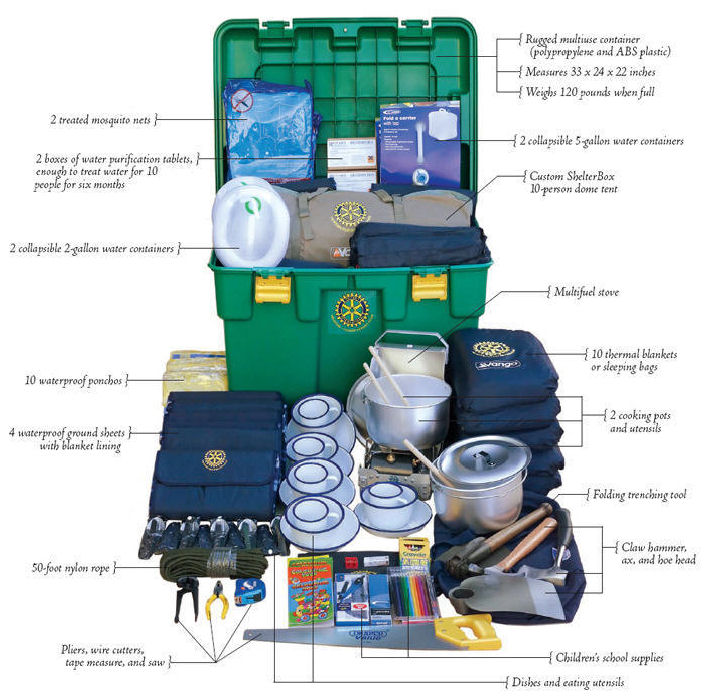
Shelter box contents
Double click to see larger view |
Purpose: Rotary Shelterboxes is an
international organisation which instantly responds to earthquake, volcano, flood, hurricane, cyclone,
tsunami or conflict by delivering boxes of aid.
According to the Shelterbox Website, each box supplies an extended
family of up to 10 people with a tent and lifesaving equipment to use while they are
displaced or homeless. The contents are tailored depending on the nature and location of
the disaster, with great care taken sourcing every item to ensure it is robust enough to
be of lasting value. |
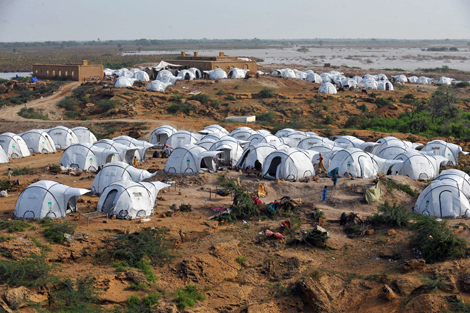
Shelter tents deployed near Karachi as a result of
floods 2010. |
The cost of a box is $1,500, including delivery direct to those
who need it. Each box bears its own unique number so as a donor you can track your box
all the way to its recipient country via the website
Highly trained
ShelterBox Response Teams
distribute boxes on the ground, working closely with local organisations, international
aid agencies and Rotary clubs worldwide.
Since its inception in 2000, ShelterBox has
firmly established itself at the forefront of international disaster relief, providing
emergency shelter for the people who need it most on every continent. |
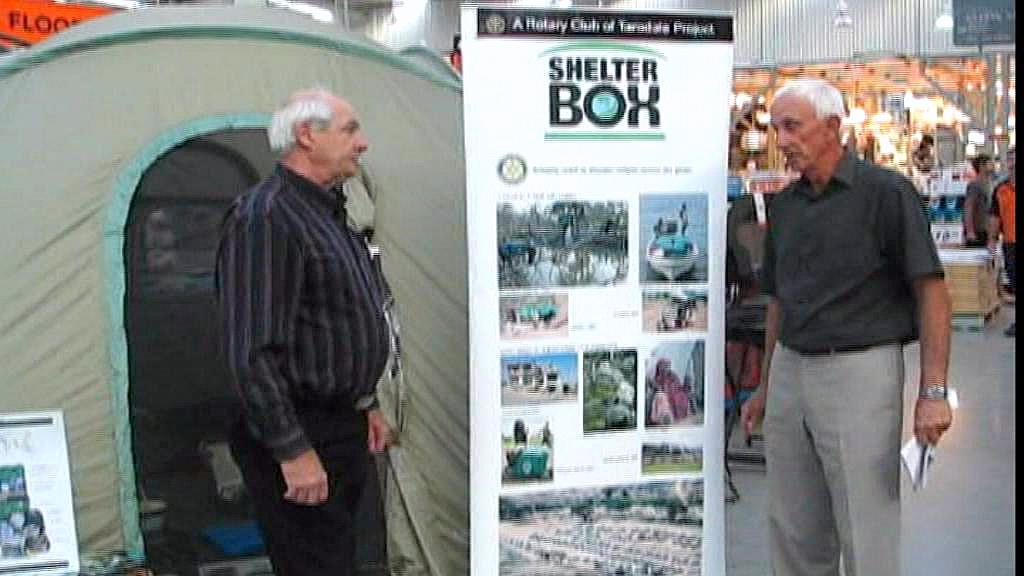
Warren Cooper talks to Alan White outside a display
tent at Mitre 10. |
Means: March
2008. Ross Ross-Taylor spoke for the first time about Shelter boxes telling
members of the global reach of the project with so far, 35,000 distributed around
the world. They cost $1,500
each which provides for the purchase of all contents and delivery when needed.
The club agreed unanimously to fund one.
April 2010. Our club has provided $3000
funding for two boxes this year. These will go towards replacing the hundreds which have
been recently sent off to Haiti and other disaster zones. Each shelterbox provides the
necessary equipment to support up to 10 people. We have also recently obtained short
term use of a display box from District resources which is currently in use by
Havelock North. It will soon be on display in our area at Mitre 10 Mega and New
World, Greenmeadows, arranged by Alan White. A small collection at the site
netted about $200 from interested public members. |
|
Outcome: Close to home, 40 shelter boxes were
dispatched to Samoa in response to the 2009 tsunami. This is just one example of
how Rotary responds to the need for shelter following natural disasters.
Return to top...
|
|
2009 Tools to Vanuatu |
|
|
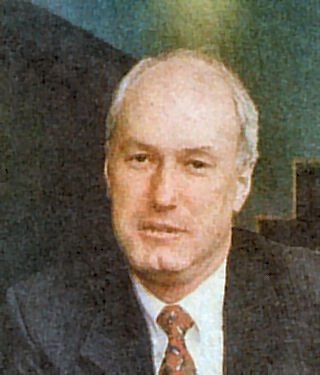
PP Nevin Dawson |
Purpose:
Basic tools were required for a tutor a building
skills on the island of Tanna. He trains villagers to acquire the skills to build
and maintain their own dwellings. The request comes from an ex-Taradale woman, Marg
Smith of the International Women’s Group of Vanuatu. She in turn was directed by
PP Nevin Dawson, club president1995-96, currently serving on the bench in
Vanuatu.
Means: Grant McDonald,
Director of International asked for members to donate tools which could be sent to
Vanuatu. Required are: level box, bricklayer’s trowel, claw hammer, hacksaw,
power planer, drill hammer, bench plane, tin snips, carpenters’ tape , measure, hand
saws, vice, clamp, chisel set, square, glass cutter, carpenters’ pencils, air glove,
bolt cutter. A drop off point was arranged at Richard Howell Motors .
Outcome: The tools were fully subscribed
and sent to Marg Smith who acknowledged their arrival and thanked the Club. |
|
Return to top...
|
|
|
|
|
